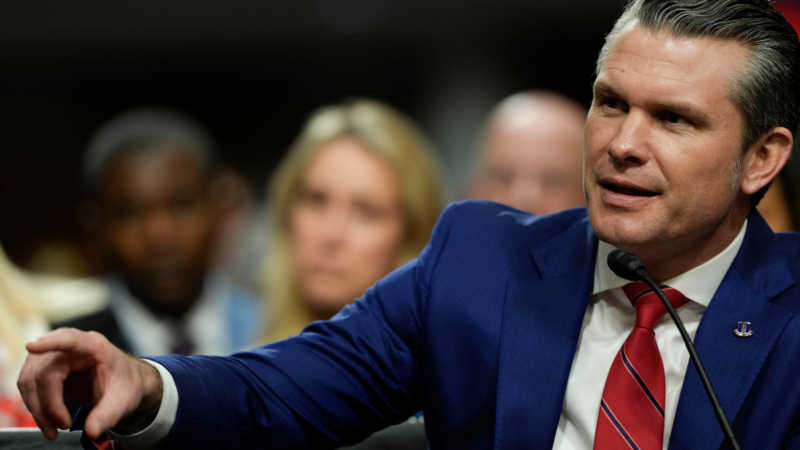Trump issues order to ban transgender troops from serving openly in the military
President Trump issued an executive order late on Monday night to ban transgender troops from serving openly in the military.
The move was no surprise. Trump spoke frequently on the campaign trail about his plans. “If you want to have a sex change or a social justice seminar, then you can do it somewhere else, but you’re not going to do it in the Army, Navy, Coast Guard, Air Force, Space Force, or the United States Marines — sorry,” Trump said at an August rally in North Carolina.
The order speaks of transgender identity in sweeping and dismissive terms, labeling it “radical gender ideology.”
“A man’s assertion that he is a woman, and his requirement that others honor this falsehood, is not consistent with the humility and selflessness required of a service member,” the order reads.
Secretary of Defense Pete Hegseth has 30 days to submit a plan to implement the order; until then many of the details, particularly how it will affect people currently serving, remain unclear.
This order harkens back to a policy that started with a series of tweets from Trump in 2017 during his first term of office. The tweets surprised military brass at the time. The policy that was ultimately developed took effect in 2019 and grandfathered in service members who were already receiving gender-affirming care. It was essentially a ban for anyone trying to enlist as trans or who wanted to begin to transition medically while serving. President Biden reversed the ban soon after he took office.
This order appears to go further than the policy from Trump’s first term. It may result in trans people with years of service, including combat tours of duty, being booted out of the military and losing their retirement benefits.
How many people could be affected
An estimated 15,000 military personnel are transgender. That number is based on a survey of active duty military and an estimate of those in the reserves and national guard.
The number of troops who will be affected by the ban is a portion of those overall numbers. According to the Defense Health Agency, which operates the Department of Defense’s electronic health records, nearly 2,000 military personnel had a diagnosis of “gender dysphoria” as of 2021. That indicates they identify with a gender that’s different from the sex they were assigned at birth.
One argument for why a ban is needed has been that it would be expensive to provide gender-affirming care to troops. “The use of public monies for transgender surgeries […] should be ended,” wrote Trump’s former Acting Defense Secretary Christopher Miller in Project 2025, a high-profile policy blueprint from the conservative Heritage Foundation.
The costs turn out to be very low. DHA’s data showed that the military spent $15 million over five years on surgeries, hormones, and psychotherapy for transgender personnel, or about $3 million per year. This cost was considered to be “budget dust” by military leadership, according to former Secretary of the Navy Ray Mabus. (In contrast, the Department of Defense spent nearly $300 million on erectile dysfunction medications, including Viagra, for military beneficiaries including retirees between 2011 and 2015.)
Rationale for the policy
The new order makes a very broad argument against gender identity.
“Expressing a false ‘gender identity’ divergent from an individual’s sex cannot satisfy the rigorous standards necessary for military service,” the order reads. “Beyond the hormonal and surgical medical interventions involved, adoption of a gender identity inconsistent with an individual’s sex conflicts with a soldier’s commitment to an honorable, truthful, and disciplined lifestyle, even in one’s personal life.”
“It’s dripping with animus,” says Sasha Buchert, a transgender veteran who is senior counsel with advocacy group Lambda Legal. “It sets the stage for rabid discrimination.”
Lambda Legal and the Human Rights Campaign have announced they will sue the federal government, and they argue that the ban described in the executive order is discriminatory. One lawsuit against the executive order was filed on Tuesday.
Current trans servicemembers brace themselves
U.S. Navy Commander Emily Shilling did two tours of duty in Iraq and Afghanistan as a Navy pilot. She is now the president of SPARTA, an advocacy organization made up of transgender troops.
Shilling says after she transitioned several years ago, she passed a slew of medical and psychological tests to prove she was still fit to fly. She has since been promoted with merit. “I’m a better leader now — as an authentic person bringing my entire self to work without that masking — than I ever was before,” she told NPR earlier this month, speaking for herself and not on behalf of the U.S. Navy or the Department of Defense.
The cost of replacing trans service members will be substantial, Shilling argues.
“These service members are deployed around the world. We have service members deployed in combat units. We have aviators, we have doctors, we have people in every single branch of service and every subspecialty — we have Special Forces,” she explains. “When we all of a sudden have to pull these people out of those units, it’s not like we can instantly recruit new people. It’s not that we can instantly re-train people to put back into those units.”
Patricia King, a transgender Army veteran, says that in the weeks of waiting for the details of the policy to be worked out, active duty trans servicemembers will be nervous.
“There are questions about who will be allowed to serve, for how long?” she says. “If you’re a trans person who is allowed to stay, will you be allowed to be promoted? Will there be a potential for harassment? There’s a lot of questions, and those unknowns create fear.”
She says even with that fear and uncertainty, transgender servicemembers say that tomorrow they will get up for work, put on their uniforms, and do their jobs.
Trump says he’s ending Secret Service protection for Biden’s adult children
President Trump said he was ending "immediately" the Secret Service protection details assigned to Democrat Joe Biden's adult children.
Israel launches deadly series of attacks on Gaza
Israel said the early Tuesday attacks were launched after Hamas refused to release more hostages held in Gaza. The strikes appeared to end the current ceasefire that took began in mid-January.
He lost his first LA Marathon medal in the fires — this weekend he got his second
15-year-old fire survivor Abel Rivera's home in Altadena burned down in January, and he lost everything — including his medal for finishing the 2024 LA Marathon.
A U.S. airman is charged in death of a South Dakota woman who had vanished in August
Quinterius Chappelle was arrested on a federal charge of second-degree murder in the death of Sahela Sangrait, according to the Pennington County Sheriff's Office.
Harvard will be free for students whose families make $100,000 or less
The expanded financial aid plan will also offer free tuition to families that make $200,000 or less. The move comes after affirmative action was barred from the admissions process.
Judge seeks sworn declaration from Justice Department in deportation case
At issue was whether plane-loads of alleged members of the Tren de Aragua gang were deported despite the judge's order to turn the planes around.








